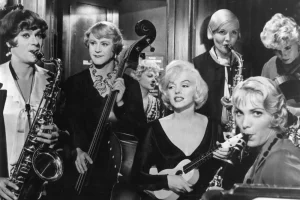Mystic River: Fact, Reality, and Narrative Directed by Eastwood
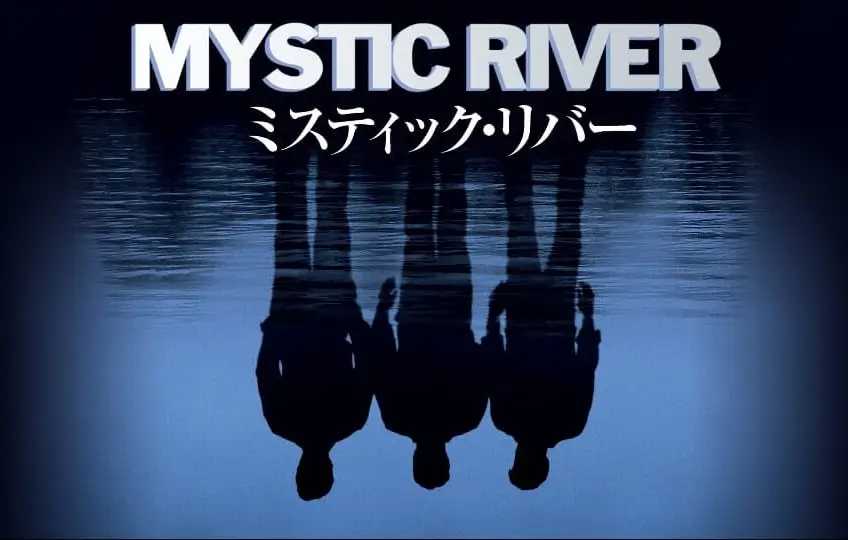
What makes Clint Eastwood a special figure isn't just his incredibly long career as a leading actor and director. Since his debut, he's consistently pursued his own form of expression, not only by continuing to act but also by directing many of his own works. It's this unwavering dedication to his craft that truly sets him apart.
The Joy of Acting, the Silence of Eastwood
In Mystic River, Sean Penn won Best Actor and Tim Robbins won Best Supporting Actor at the 76th Academy Awards. With two of the three main characters winning, it’s easy to get lost in their performances. And while the acting by all three leads is truly incredible, what I want to explore here is how the film brilliantly combines its narrative structure with cinematic expression. My goal is to carefully unravel each knot, examining how Eastwood interpreted the novel and how his actors responded to his direction.
For this analysis, I referred to the film itself as well as the audio commentary by Tim Robbins and Kevin Bacon, which is included on the DVD. While audio commentaries often feature the cast and crew reminiscing about filming challenges, that’s not the case with this film's commentary.
Since both Tim Robbins and Kevin Bacon are actors as well as film directors, they speak from both perspectives. In their conversation, you can hear not only their respect for Eastwood and their joy in being in his film but also the deep satisfaction of having experienced his direction firsthand. The dialogue between the two of them is an extremely valuable commentary—it not only deepens your understanding of the film but also provides a three-dimensional look at the relationship between acting and directing.
A Commitment to Boston

As a director fully committed to his craft, Eastwood was adamant about filming in Boston, the city where the author Dennis Lehane was born and raised and the setting of the novel. In fact, they had originally planned to shoot in Vancouver to save on costs. But Eastwood strongly insisted he didn't want to compromise the novel's atmosphere. His refusal to compromise became the very DNA of the story that was about to unfold.
The film opens on a back alley under a gray Boston sky, where three boys start playing hockey. The story begins with a kidnapping that occurs in this alley. The deserted street has an unsettling, chilly atmosphere that makes the event feel so authentic, you might find yourself wondering if the abduction actually happened. On this point, Lehane stated at a lecture at Harvard University that the kidnapping was a fictionalized account, expanded from a real-life experience from his childhood. The relevant passage is quoted below.
Lehane implied that his character Dave’s abduction was an alternate scenario of what he and his foe might have experienced had their failure to confront the officers about their identities proved more serious.※
Let me share one more piece of testimony.
On the YouTube channel "About the Authors TV," he talks about the real-life experience that inspired the kidnapping. While he also described the reactions of people around him at the Harvard lecture, in this video, Lehane himself vividly reenacts the words of the police officer and his mother with great emotion. You should definitely watch it with your preferred subtitle language.
From these statements by the original author, it's clear that the film Mystic River is not based on a true story.
If this were simply a story about a kidnapping and the men who were affected by it, the location might not have been a crucial element. Filming in Vancouver would have been fine. However, Eastwood insisted on Boston.
I imagine the reason is that he didn't want to dilute the sense of reality—that an incident like this could have easily occurred—for the sake of cinematic convenience. This attitude seems to strongly reflect not only the sincerity toward reality that is at the heart of the narrative, but also his own sense of ethics.
From Real-Life Experience to Story
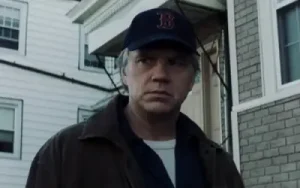
The decisive difference between the true story and the film appears in the very next scene. While the real-life Lehane told his mother what had happened in the alley, the boys in the film, Sean and Jimmy, seek help from two men talking on an upstairs terrace.
In essence, the story begins from this scene, and this single shot—where the person the boys turn to is replaced from a woman to a man—fundamentally reverses the narrative's structure. The men listening to them are later superimposed with the figures of Jimmy and Dave, who, with their emotions wavering, beg for consent and sympathy for a "what if" fantasy about that incident. This is the very process that makes Mystic River a film.
However, as if weaving through the gaps of the men shackled by their past, the women gradually begin to assert their presence. As this happens, the narrative's direction shifts, leading to an unimaginable final scene. The intense emotional expression shifts from men to women, depicted lyrically through dialogue and editing. This transformation is centered on the actions of someone who, out of their own weakness, betrays the very "bonds" that lie at the heart of the film's theme.
Casting Shadows in the Shade
Eastwood’s goal of bringing a sense of truth to the novel is also evident in his decision to use very little artificial lighting.
While it's common to use lights to make an actor's face and expressions clear, the director disliked this approach. As a result, in scenes where a character walks in the shade of an eave, their face appears dim and blurry. There are even moments when the camera doesn't focus on Dave's face. His pale, lifeless expression, more than just a result of the natural light, suggests the gloomy mind of a man who can't escape his past.
What’s more, the lighting in Dave’s house is dim, creating a gloomy atmosphere. Even though he lives a perfectly ordinary life with a wife and children, it feels as though his psychological state has seeped into the home itself. The cinematography by his long-time collaborator, Tom Stern, which is unified by a muted gray color palette, makes you feel like the film is a true story.
The Creation of the Three Protagonists
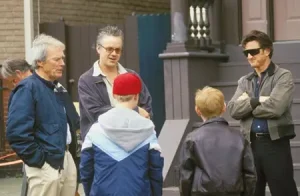
Eastwood said that as soon as he read the novel, three actors immediately came to mind for the main roles: Tim Robbins, Kevin Bacon, and Sean Penn. In particular, he couldn't imagine anyone but Sean Penn playing Jimmy, the father whose daughter is murdered.
The childhood friend and detective, Sean Devine, played by Bacon, is different from the other two; he doesn't show much emotion, but his expressionless face hints at something more than just a police officer's demeanor.
Tim Robbins' character, Dave, is a man who still can't escape the pain he suffered as a child. With his unkempt hair and pale skin, he looks so old he could be mistaken for an elderly man and doesn't seem to be the same age as Jimmy and Sean at all. Although Tim Robbins is over six feet tall, he appears like a tiny insect on screen. In preparing for the role, he focused entirely on imagining the character's feelings rather than using his own personal experiences.
It's fascinating that all three of the main actors are also directors. Each of them has said they learned something from Eastwood’s directing style. In the audio commentary, Tim Robbins and Kevin Bacon spoke about the immeasurable joy of being able to focus on their acting with complete peace of mind, all because of Eastwood. They were greatly inspired by his direction. The words of these two veterans show their deep trust in Eastwood, both as an actor and as a director.
Eastwood's Directing Style
Eastwood typically finishes filming in just one or two takes, rarely more than three. This low number of takes requires actors to deliver fresh, natural performances. However, even if an actor felt a take was a mistake, Eastwood might still decide it was a good one. Let's look at an example.
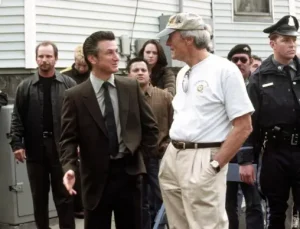
In the hospital lobby, Jimmy and Sean are talking. Jimmy, overcome with emotion, slams his hand on the table, spilling coffee, which Sean then wipes up with a paper napkin. It was a sudden accident, but Eastwood had them continue acting and used the take.
Another example is a shot where Dave comes out onto a balcony to smoke and lights a match. Startled when Jimmy calls out to him, Dave burns his hand with the match. Tim Robbins apparently thought it was a mistake, but Eastwood used it as a good take.
Eastwood’s flexibility with sudden accidents wasn't just for the actors. In a shot showing the sky for a scene transition, a large flock of pigeons was supposed to fly, but only a few birds appeared. Eastwood said, "Well, that's how it is," and gave up on the shot. Tim and Kevin said that an average director would have been persistent, insisting on getting the shot with a large flock of pigeons, and they commented that this non-attachment to a specific outcome is also characteristic of Eastwood.
A day of filming wrapped up in around eight hours. This gave the actors plenty of time to decompress after work—they could hit the gym, enjoy relaxed dinners with their families, and just unwind. To prepare for the next day's shoot, they would even gather on their own to do a script reading.
Men Stuck in Time
That one sudden accident—the hockey puck falling into a drain on the side of the road—was more than just bad luck that ended their game. It indirectly led to a fateful encounter with two strangers that would change young Dave's life forever. His life froze in that moment, and his friendship with his best friends ended right there.
Decades later, Dave is a husband and father, playing baseball with his son. But the emotional scars from his childhood are still with him, as if the ball were still sitting at the bottom of that drain. When his son tries desperately to reach for the ball, Dave weakly calls out, "Let's just do it another time," and walks away. That whisper, utterly devoid of any will to retrieve the ball, is the voice of Dave himself—the man who sank into darkness after that terrible incident. He has become a mere ghost of the past.
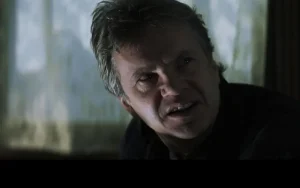
A defeated Dave only lets down his guard after watching a Dracula movie on TV. In these moments, he seems like a medium possessed by a spirit who died with a grudge. If pure resentment could take on a physical form, this is what it would look like.
He's living, but he might as well be dead. The dark basement where he was trapped brings to mind the night where Dracula roams, and the sleeping bag he was given resembles a coffin where he can finally rest.
I can't help but wonder if the name Dave was chosen to foreshadow his misfortune.
The basement young Dave desperately fled from feels like a sunless cave. It's interesting to note that in English, the word for cave is Cave, which starts with the letter C. And in the alphabet, D—the first letter of Dave's name—comes right after C.
What's more, Dave couldn't even finish carving his name into the asphalt. He was taken away, his name incomplete, before he could get to the letter E—the one that follows C and D. This specific scene, which isn't in the original novel, uses cinematic language to foreshadow Dave's entire life.
It might sound like a childish word game, but just as the novelist created a story from his real-life experience, just as the adults the boys turned to for help were replaced from women to men, and just as Jimmy's wife's name—which I'll discuss later—resembles that of a classic wicked woman, perhaps it's not so wrong after all to see a character's psychological wounds and his life reflected in the simple arrangement of letters.
Just as we were able to discern a sense of Dave's unknown past and inner world from his name, I want to explore the possibility that there's a hidden intention behind the name of another character as well.
God, Devine
The detective Sean’s last name, Devine, is a homophone for the word “divine,” immediately conjuring the image of a god. As Sean gazes out at the Boston skyline across the Mystic River, he looks like a divine figure watching over the world from above.
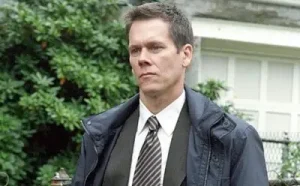
The divine Sean isn't allowed the comforts of an earthly life. He talks to his estranged wife, Lauren, on the phone, but we never hear her voice. Her personality vanishes from the shots of her mouth, and she’s presented as a mere symbolic figure of a woman. Unlike Dave and Jimmy, Sean hasn't built a stable marriage, and he even shows a certain asceticism by rejecting an invitation from a female colleague. His attitude demonstrates a clear self-awareness as a holy man. Detective Sean is the one who drives the narrative, working with his partner and coming into contact with two couples. Without him, it would have been impossible to connect the death of Jimmy's daughter to the past of the three childhood friends.
At dawn, Jimmy sits on the curb and looks up at Sean, who is standing beside him. Sean takes a sip of the whiskey he's offered and sits down. The sight of them sitting together is reminiscent of a childhood friendship lost, and once again, they talk about what happened to Dave. This brief conversation replaces the realistic pursuit of the novel with a literary return. Along with the cinematic shots, it takes us, the audience, back to the past—but that day is now gone. Dave's dream and the truth about his beloved daughter's murder are now out of reach. The three of them each imagine what it would have been like if they had been in that car, but their thoughts only drift further apart.
Brian Helgeland’s screenplay, in this final scene where all the past is finally settled, gives Sean a kind of sweet happiness that surpasses the novel. The ringing of his wife's phone call and her voice are the very bond he longed for more than anything. So, while this film is centered on a single crime, it's also fitting to call it a story about Sean's return from the divine realm to earth to reclaim his happiness—a kind of secularization of a holy man.
The Three Wives
In many ways, Mystic River is a story about three men, but it’s just as much a story about their wives. Having already discussed how Sean’s wife appears as a symbolic female figure, I’d now like to turn my attention to the remaining two.
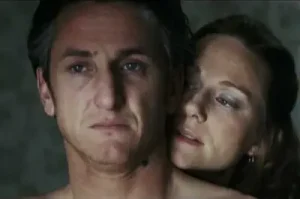
Annabeth, Jimmy’s wife, initially seems like a simple ornament, a second wife who stands a step behind her husband. While her husband is a man with a complex presence—a former convict who now runs a convenience store while still having ties to the city’s underbelly—the moment she hears his confession to murder, she begins to show a wickedness that even exceeds his own.
The way she pushes him onto the bed and climbs on top, exposing a carnal femininity as she lures him down a path of evil, is reminiscent of Lady Macbeth, the classic wicked wife. It’s a safe bet that many people have speculated about the phonetic similarity between Annabeth and Shakespeare’s Macbeth.
While Lauren exists as a symbol of womanhood and Annabeth as the embodiment of evil, Dave's wife, Celeste, doesn't possess the same kind of strength. Still, she's the one who shows the widest range of emotional turmoil. This film's story may be centered on a father's rage over his daughter's murder, but it's her actions—her growing suspicion of her husband and her desperate call for Jimmy’s help—that truly change the course of the plot.
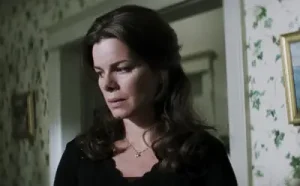
Perhaps because of this, Celeste carries all the weight of her sadness and distrust alone, a burden brought on by her own weak will. Unlike Lauren and Annabeth, she is so fragile she seems about to be swallowed whole by her surroundings. While this tragedy owes a lot to Marcia Gay Harden's delicate acting, even more, the spaces Celeste inhabits perfectly reflect her fate.
Cinematic expressions that project her inner darkness—like unlit stairways or long black shadows stretching on the wall—fall squarely within the lineage of cinematic suspense that was passed down from the psychological depictions of German and French Expressionist cinema to Hitchcock. Her figure in the final parade scene, running through a crowd of spectators, desperately calling her beloved child's name even as he ignores her, suggests anonymity swept away by the masses, like Baptiste from Children of Paradise, and a life abandoned by society, like Ricci from Bicycle Thieves.
Celeste is a character who seems to embody the cinematic expressions of Expressionism and Romanticism all on her own. She then vanishes from the screen as if she is escaping the narrative itself. That confined and lonely fate is truly worthy of being called a tragedy.
Earthly Love, The Parade of Evil Oaths

In stark contrast to Celeste, who wanders through the dark shadows, Lauren and Annabeth appear in the warm sunlight, their figures peaceful and serene. Sean puts his arm around his wife's shoulders, with a small child by their side. Sean, the god of judgment, has now descended to earth, become human, and found his happiness.
On the other side of the street, Jimmy descends the stairs to join Annabeth and his band of villains. He puts on his dark sunglasses, a gesture that looks like he's preparing to descend into a world of evil. A dramatic gesture that fills the air with the sound of applause, it is a solemn oath of his grim resolve.
As Sean locks eyes with Jimmy, he makes a gun with his fingers and mimes shooting him. Kevin Bacon has revealed that, unsure of the gesture's meaning, he asked the director. To this, Eastwood replied, "That's for the audience to decide."
Two Ambiguous Endings
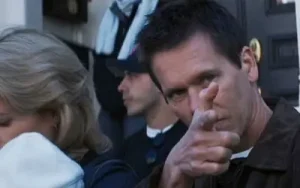
Even in the novel, the meaning behind the pistol gesture Sean makes is not explicitly stated. At a lecture, Mr. Lehane was asked about this scene, and he responded as follows:
Lehane said he learned the two most important aspects of writing when he was 16 years old. The first, he said, is that a writer never explains elements of a book that are not expressly written.
In keeping with this principle, Lehane bristled when one audience member asked about an ambiguous gesture that Bacon makes towards Penn in the last scene of the movie.
“There are a few things in this world that I will never explain, and this is one of those,” Lehane said. “It’s there to make you think, not for me to say, ‘Well, actually, it means this.※
In the novel, Sean deduces that Jimmy is the murderer and promises Celeste at the parade that he will arrest him. This scene, however, is absent from the film. Instead, Sean simply gives Celeste a slight nod, and his expression suggests the contentment of a man who wants to protect the happiness he’s found more than his job.
The editing that connects Sean and Celeste in this scene isn't fluent. It feels a little forced, leaving a sense of lingering doubt. Perhaps a scene where the two exchange words was filmed but later deleted. It's unknown whether that was a decision made by Joel Cox, another of Eastwood's long-time collaborators.
Whatever the case, Eastwood chose a second ambiguous ending that differs from the novel. While the finger-gun gesture could certainly be interpreted as a sign of his intent to arrest Jimmy, the film's conclusion—compounded by the awkwardness that precedes it—remains even more ambiguous than the book.
But one thing is certain: the presence and absence of eye contact in two consecutive scenes.
First, Celeste spots Annabeth across the street, but Annabeth doesn't notice her. Then, Sean and Jimmy make eye contact. The two scenes are shot with the same composition, but in one, no eye-to-eye communication is established, while in the other, the eye contact develops into an exchange of gestures—a finger-gun and a nod of acceptance. One could even argue that Annabeth is intentionally ignoring Celeste.
This contrast in eye contact between the women's distrust and the men's conflict unconsciously plants the idea in the audience's mind, leaving room for even more ambiguity.
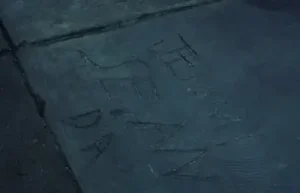
The film then cuts to the names the three boys carved into the asphalt. The camera's movement, which draws slightly closer as if repeating the beginning of the previous scene, draws us, the audience, back to that day in the past. The image then transitions to the ripples of the Mystic River, slowly sinking to the bottom as the story ends. It's easy to connect Dave's fate with this darkness.
This direction for the final scene—which uses a repeated camera movement to connect the present to the past and back to the present again—is a truly unique cinematic choice that is not in the original novel.
Brian Helgeland, the screenwriter, took the expansive novel, which detailed the characters' psychology and backstories throughout, and sharpened the narrative's focus by limiting the number of characters. He then condensed the story by strategically placing key elements, such as the opening hockey scene, the recurring conversations between Dave and Jimmy about their lost loved ones, Sean’s deductions, and the exchange of glances in the final scene.
It can be said that the resulting work, Mystic River, is a film in which director Clint Eastwood brought all of these elements to life through his unique cinematic direction.
A Choice of Uncertain Futures
Many Hollywood films end on an ambiguous note, hinting at a future development to whet the audience's appetite for a sequel. However, no sequel to Mystic River was ever planned from the beginning. This willingness to choose an undetermined future is something that feels like it could be superimposed on Eastwood's own career.
He rose from Western TV dramas to become a global movie star. He then shattered the public's image of a detective by playing Dirty Harry, creating a new kind of star persona. Eastwood has reflected that, had he continued to make films in that series, he "could have smoothly continued to climb the ladder of stardom."
But he chose not to take that path, instead beginning to produce and direct his own films. This unwillingness to walk a pre-determined path is what transformed Eastwood from a mere celebrity into a true artist. It is precisely this attitude that makes him seem like a solitary figure in the world of Hollywood cinema.
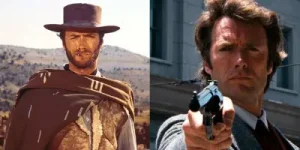
Audio Commentary for a Deeper Look
It's extremely difficult to see Mystic River in a movie theater in Japan today. This inevitably leads to watching it on DVD, which brings with it the added benefit of being able to hear the behind-the-scenes stories of the film's production. Of course, you can also watch the film on streaming services, but unfortunately, you can't listen to the audio commentary.
In other words, this is why DVDs still offer a superior way to actively and more deeply engage with a film.
In addition to Mystic River, Eastwood has made many films centered on the theme of old men and young boys and girls, such as Million Dollar Baby, Changeling, Gran Torino, and Cry Macho. The reason for this can also be found in this film's audio commentary.
Eastwood says that if the death penalty is ever justified, it should be given to those who steal the freedom of children with a future. While this statement is full of ethical tension, it also connects to the sincerity toward reality that flows through the very core of his films. At the origin of his creative work is a sincere and dispassionate will toward events.
Not only for general viewers, but also for those who want to analyze film as a form of expression, the knowledge gained from DVD audio commentaries is vast. They allow you to understand the intentions of the production and the director's thoughts beyond simply following the story. This knowledge will surely resonate deeply within your heart.
※The Harvard Crimson, July 23, 2004
Originally written in Japanese and translated using Gemini AI.

